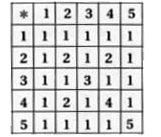Determine whether or not each of the definition of given below gives a binary operation. In the even that is not a binary operation , give justification for this .
On R , define by Solution in Gujrati
The correct Answer is: is a binary operation on
Step by step video, text & image solution for Determine whether or not each of the definition of ** given below gives a binary operation. In the even that ** is not a binary operation , give justification for this . On R , define ** by a" * " b = ab^2 by Maths experts to help you in doubts & scoring excellent marks in Class 12 exams.
Topper's Solved these Questions
- BOOK - KUMAR PRAKASHANCHAPTER - RELATIONS AND FUNCTIONS EXERCISE - EXERCISE 1.425videos
RELATIONS AND FUNCTIONS
- BOOK - KUMAR PRAKASHANCHAPTER - RELATIONS AND FUNCTIONS EXERCISE - MISCELLANEOUS EXERCISE - 120videos
RELATIONS AND FUNCTIONS
- BOOK - KUMAR PRAKASHANCHAPTER - RELATIONS AND FUNCTIONS EXERCISE - EXERCISE 1.217videos
RELATIONS AND FUNCTIONS
- BOOK - KUMAR PRAKASHANCHAPTER - PROBABILITYEXERCISE - Practice Paper - 13 (Section - D (Answer the following questions))2videos
PROBABILITY
- BOOK - KUMAR PRAKASHANCHAPTER - THREE DIMENSIONAL GEOMETRYEXERCISE - PRACTICE PAPER -1116videos
THREE DIMENSIONAL GEOMETRY
Similar Questions
Consider a binary operation ∗ on the set {1,2,3,4,5} given by the following multiplication table.
(i) Compute (2*3)*4and2*(3*4)
(ii) Is ∗ commutative ?
(iii) Compute (2*3)*(4*5)
(Hint: use the following table )
 03:31View Solution
03:31View SolutionLet f:R→R be defined as f(x)=10x+7. Find the function g:R→R such that gof = fog = Ig
03:03View SolutionShow that the function f : R→R, defined by f(x)=1x is one - one and onto , where R is the set of all non - zero real number . is the result true, if the domain R is replaced by N with co-domain being same as R ?
02:26View SolutionIn a game, a man wins a rupee for a six and loses a rupee for any other number when a fair die is thrown. The man decided to throw a die thrice but to quit as and when he gets a six. Find the expected value of the amount he wins/loses.
02:41View SolutionFind the direction cosines of a line which makes equal angles with the coordinate axes.
View SolutionDetermine whether or not each of the definition of given below gives a binary operation. In the event that * is not a binary operation, give justification for this.
(i) On Z+, define ∗ by a∗b=a–b
(ii) On Z+, define ∗ by a∗b=ab
(iii) On R, define ∗ by a∗b=ab2
(iv) On Z+, define ∗ by a∗b=|a–b|
(v) On Z+, define ∗ by a∗b=a03:31View SolutionDetermine whether or not the definition of * On Z+ , defined * by a⋅b=ab gives a binary operation. In the event that * is not a binary operation give justification of this. Here, Z+ denotes the set of all non-negative integers.
04:07View SolutionDetermine whether or not the definition of * On R , define by a⋅b=ab2 gives a binary operation. In the event that * is not a binary operation give justification of this. Here, Z+ denotes the set of all non-negative integers.
03:12View SolutionDetermine whether or not the definition of * On R , define * by a⋅b=a+4b2 gives a binary operation. In the event that * is not a binary operation give justification of this. Here, Z+ denotes the set of all non-negative integers.
02:24View SolutionDetermine whether or not each of the definition of given below gives a binary operation. In the event that is not a binary operation, given justificantion for this.
(i) On Z+, define * by a * b = a- b
(ii) On Z+, define * by a * b = ab
(iii) On R,define * by a * b−ab2
(iv) On Z+, define * by a *b =|a−b|
(v) On Z+, define * by a* b = a02:19View SolutionDetermine whether or not each of the definition of '∗' given below gives a binary operation. In the event that '∗' is not a binary operation, given justification for this:
(i) On Z+, define '∗' by a∗b=a−b
(ii) On Z+, define '∗' by a∗b=ab
(iii) On R, define '∗' by a∗b=ab2
(iv) On Z+, define '∗' by a∗b=|a−b|
(v) On Z^(+), define '∗' by a∗b=a.02:30View SolutionDetermine whether or not each of the definition of given below gives a binary operation. In the event that * is not a binary operation, give justification for this.
(i) On Z+, define ∗ by a∗b=a–b
(ii) On Z+, define ∗ by a∗b=ab
(iii) On R, define ∗ by a∗b=ab2
(iv) On Z+, define ∗ by a∗b=|a–b|
(v) On Z+, define ∗ by a∗b=a01:59View SolutionDetermine whether or not the definition of * On Z+ , defined * by a⋅b=a−b gives a binary operation. In the event that * is not a binary operation give justification of this. Here, Z+ denotes the set of all non-negative integers.
02:00View SolutionDetermine whether or not the definition of * On Z+ , defined * by a⋅b=ab gives a binary operation. In the event that * is not a binary operation give justification of this. Here, Z+ denotes the set of all non-negative integers.
02:14View SolutionDetermine whether or not the definition of * On R , define by a⋅b=ab2 gives a binary operation. In the event that * is not a binary operation give justification of this. Here, Z+ denotes the set of all non-negative integers.
01:53View SolutionDetermine whether or not the definition of * On Z+ , define * by a⋅b=|a−b| gives a binary operation. In the event that * is not a binary operation give justification of this. Here, Z+ denotes the set of all non-negative integers.
01:53View Solution

